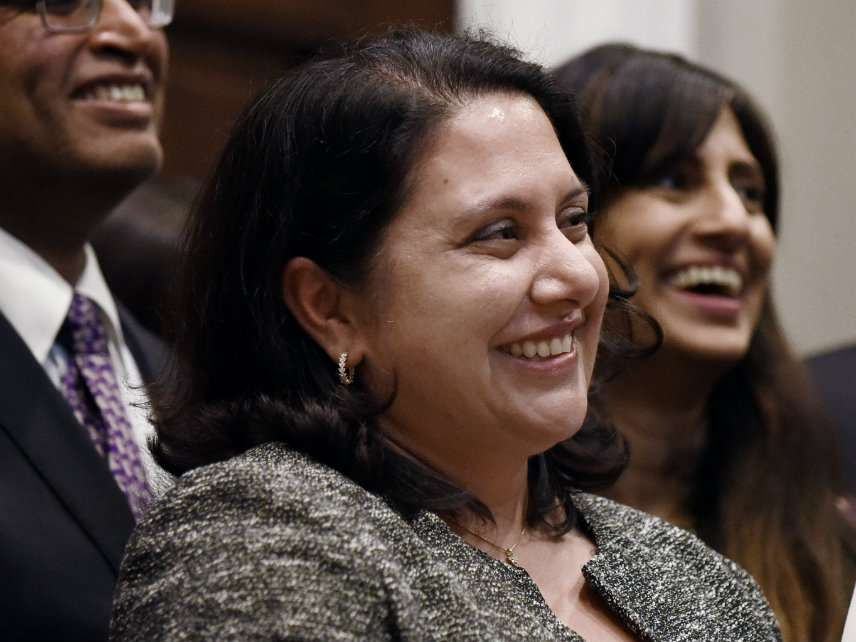Neomi Rao Was Right About Dwarf Tossing, Dignity, and Consent. She Deserves To Be a Federal Judge.
- OurStudio

- Nov 26, 2018
- 3 min read

Abaca Press/Douliery Olivier/Abaca/Sipa USA/Newscom
Seven years ago Neomi Rao, President Donald Trump's pick to replace now-Justice Brett Kavanaugh on the U.S. Court of Appeals for the District of Columbia Circuit, defended the concept of "dwarf tossing"—wherein someone with dwarfism voluntarily allows himself to be thrown, while wearing protective gear, onto a padded surface. While invoking the example was no doubt provocative, Rao's larger point dealt not with the sport itself but with the dignity inherent to making consensual arrangements.
Rao is best known for her strong background in the regulatory world—she currently serves as administrator of the Office of Information and Regulatory Affairs. If she is confirmed, her docket at the D.C. Circuit will relate directly to her expertise.
In the meantime, some are criticizing her and misrepresenting her point about dwarf tossing. Her arguments deserve a more careful look.
Writing in The Volokh Conspiracy in 2011, Rao discussed the predicament of a man named Mr. Wackenheim. By her description, Wackenheim was a dwarf living in France who allowed others to throw him for sport. This was his source of income. After several French cities banned the practice, he "challenged the orders on the grounds that they interfered with his economic liberty and right to earn a living." Higher courts eventually upheld the bans, ruling that the practice of dwarf tossing offended human dignity.
As Rao explained, former French President Nicolas Sarkozy used similar justifications to support the country's ban on burqas. The former president, she noted, said that the religious wear "runs counter to women's dignity." But as Rao rightly responded, "the debate focuses little on what Muslim women think about the full veil or why some of them wear it in public. Instead of associating dignity with religious choice, those who would ban the veil treat dignity as a different social ideal—one that measures up to majority standards of individual self-expression."
"Respect for intrinsic human dignity, however, would favor individual choice," the now-D.C. Circuit nominee added. "As with other similar theories, it is a short step from having substantive ideals of dignity to coercion of individuals in the name of these ideals."
Rao's argument is a serious one. Her point is that one can disagree with another's choices, but dignity is about the right to make those choices instead of having the government make them for us.
If you only read about Rao's work in Mother Jones, however, you might have thought that Rao simply has a niche affinity for dwarf tossing. Mother Jones writer Stephanie Mencimer also criticized Rao for wanting to get rid of regulations. Yet notably, writer Mencimer did not make the obvious connection between regulatory skepticism and Rao's concern that certain regulations can reduce individual choice, thereby reducing one's dignity.
Additionally, Mencimer cited Rao's critiques of Justice Anthony Kennedy's writings on dignity as indicative of her unspoken opposition to the right to same-sex marriage. However, one paper written by Rao and linked in the Mother Jones piece barely touched on the subject. In another linked piece, rather than condemning same-sex marriage, Rao's critique of United States v. Windsor (2013), which struck down part of the federal Defense of Marriage Act, was narrow and limited to the precise approach taken by the Court. "The approach in Windsor," she wrote, "differs from other civil rights cases by separating dignity from rights—it recognizes the dignity of same-sex marriage, but not a right to same-sex marriage." She went on to lament that the Court dealt not with "a particular sexual behavior" nor "the fundamental right to marry," but only with "the dignity of having your personal relationships recognized by the federal government."
Indeed, Rao seemed to suggest that the opinion should have dealt directly with the fundamental right to marry rather than the dignity of having one's relationship recognized by the federal government. As Rao observed, "a right to recognition, standing alone, has never been part of our constitutional jurisprudence."
Twisting and trivializing Rao's words is a cheap attack. Her work on dignity is formidable and deserves a thoughtful examination.




Comments